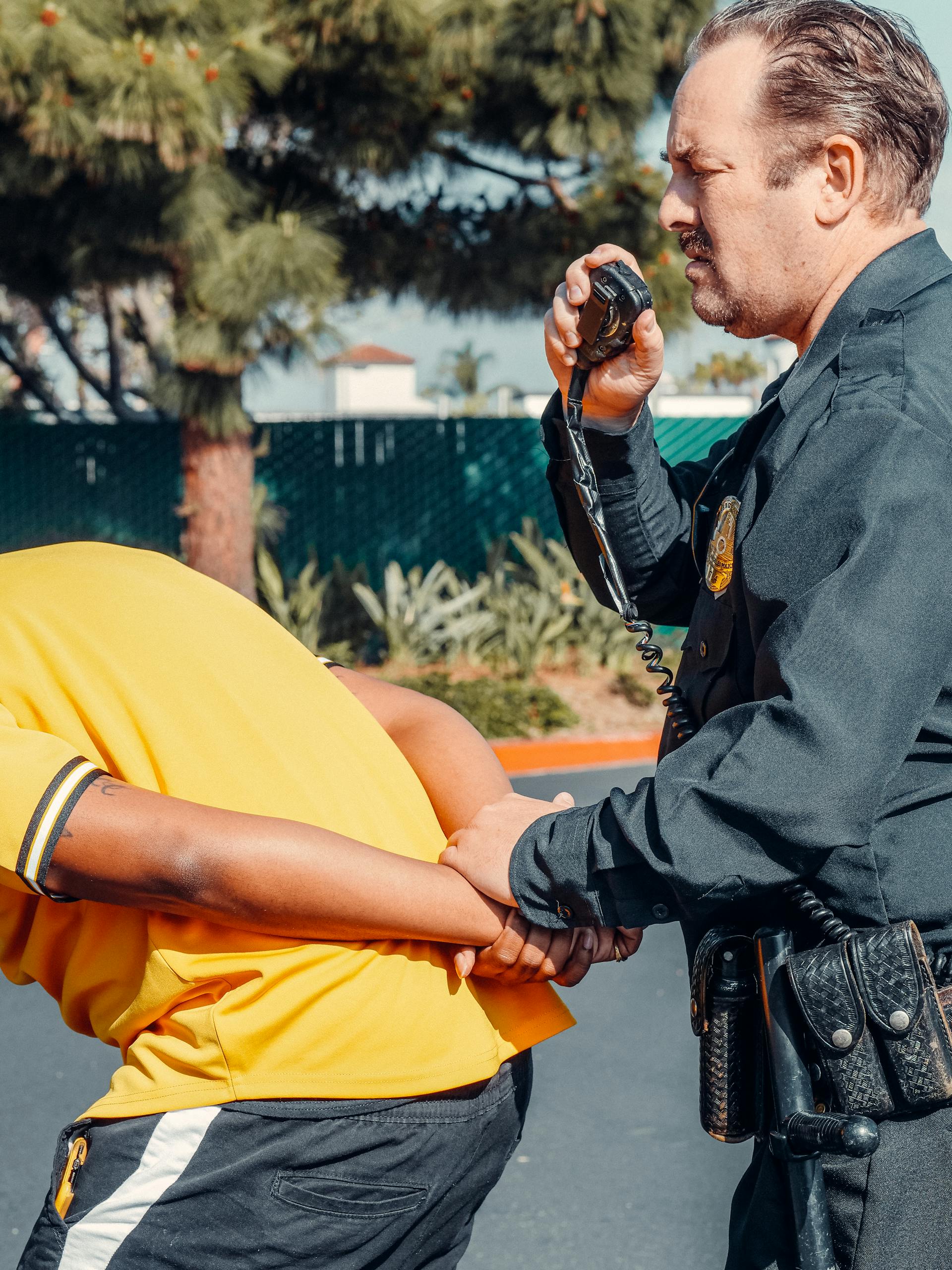Is Resisting Arrest a Felony? Understanding the Consequences in 2025
Discover when resisting arrest becomes a felony, its legal implications, and potential consequences. Learn about state variations, defense strategies, and how to protect your rights.
Introduction
When confronted by law enforcement, the natural fight-or-flight response can lead to serious legal consequences. But does resisting arrest always result in felony charges? Let’s delve into this complex issue and uncover some eye-opening statistics:
- According to the Bureau of Justice Statistics:
- Approximately 1 in 5 arrests involve some form of resistance
- About 15% of officers report being injured during resistant arrests
- A study by the National Institute of Justice found:
- Resisting arrest charges are more likely to be filed in urban areas
- Approximately 60% of resisting arrest cases involve additional charges
- The Innocence Project reports:
- False arrests and misconduct contribute to some cases of resisting arrest
- About 10% of exonerees were initially charged with resisting arrest
These statistics highlight the prevalence and complexity of resisting arrest cases. Let’s explore when this charge crosses the line into felony territory.
When Does Resisting Arrest Become a Felony?
Resisting arrest can be classified as either a misdemeanor or a felony, depending on various factors:
- Degree of resistance:
- Passive resistance (e.g., going limp) is typically a misdemeanor
- Active resistance (e.g., pushing or striking an officer) is more likely to be charged as a felony
- Presence of weapons:
- Using or threatening to use a weapon against an officer often results in felony charges
- Injury to law enforcement:
- Causing injury to an officer during resistance can elevate the charge to a felony
- State-specific laws:
- Some states automatically classify resisting arrest as a felony
- Others differentiate based on the circumstances of the resistance
- Prior criminal history:
- Repeat offenders may face felony charges for what would otherwise be a misdemeanor
- Concurrent offenses:
- Resisting arrest during the commission of another felony is often charged as a felony itself
- Federal vs. state jurisdiction:
- Resisting arrest of federal officers is typically a federal felony
It’s important to note that the line between misdemeanor and felony resisting arrest can be thin and often depends on the discretion of prosecutors and the specific circumstances of the incident.
State-by-State Breakdown: Resisting Arrest Laws
Laws regarding resisting arrest vary significantly across states. Here’s a snapshot of how different states approach this offense:
- California:
- Resisting arrest is generally a misdemeanor
- It can be elevated to a felony if it involves force or violence
- Texas:
- Simple resisting arrest is a Class A misdemeanor
- Becomes a third-degree felony if a weapon is used
- New York:
- Resisting arrest is a Class A misdemeanor
- Can be elevated to a felony if it causes injury to the officer
- Florida:
- Resisting without violence is a first-degree misdemeanor
- Resisting with violence is a third-degree felony
- Illinois:
- Resisting or obstructing a peace officer is a Class A misdemeanor
- Becomes a Class 4 felony if it causes injury to the officer
- Georgia:
- Misdemeanor obstruction for non-violent resistance
- Felony obstruction for violence or threats of violence
These examples illustrate the variability in how states classify and punish resisting arrest, with the use of force or resulting injuries often being the dividing line between misdemeanor and felony charges.
Real-World Examples: When Resisting Arrest Escalates
To better understand how resisting arrest can lead to felony charges, let’s examine three scenarios:
- The Traffic Stop Gone Wrong
Situation: John is pulled over for speeding. Believing the stop is unjustified, he refuses to exit his vehicle and locks the doors. When officers attempt to remove him, he struggles, accidentally elbowing an officer in the face.
Outcome:
- Charges: Resisting arrest, assault on a peace officer
- Potential felony: Yes, due to injury to the officer
- Consequences:
- Possible felony conviction
- Jail time (varies by state, potentially 1-5 years)
- Fines
- Criminal record
- Key takeaway: Even unintentional injury to an officer can result in felony charges.
- The Protest Participant
Situation: Sarah is part of a peaceful protest that turns chaotic. When police begin arrests, she links arms with other protesters and goes limp. Officers must carry her to the transport vehicle.
Outcome:
- Charges: Resisting arrest, potentially disorderly conduct
- Potential felony: Unlikely, typically a misdemeanor
- Consequences:
- Fines
- Possible short jail term (days to weeks)
- Community service
- Key takeaway: Passive resistance is generally treated less severely but can still result in charges.
- The Repeat Offender
Situation: Mike, with prior convictions for resisting arrest, is confronted by officers serving a warrant. He attempts to flee, shoving an officer in the process.
Outcome:
- Charges: Felony resisting arrest, assault on a peace officer
- Potential felony: Yes, due to prior history and use of force
- Consequences:
- Likely felony conviction
- Extended jail time (potentially 2-10 years, depending on state and priors)
- Substantial fines
- Probation upon release
- Key takeaway: Prior history and active resistance significantly increase the likelihood of felony charges.
These examples demonstrate how circumstances, intent, and prior history can influence whether resisting arrest is charged as a misdemeanor or felony.
Unique Scenarios and Outside-the-Box Questions
Now, let’s explore some less common scenarios and questions related to resisting arrest:
- Can you be charged with resisting arrest if the original arrest was unlawful? In most jurisdictions, the legality of the original arrest doesn’t justify resistance. However, it may be used as a defense in court.
- Is it resisting arrest if you run away before the officer touches you? This could be charged as “evading arrest” or “fleeing,” which in some states can be as serious as resisting arrest.
- Can you resist arrest if you’re having a medical emergency? While medical emergencies can be used as a defense, it’s crucial to communicate the emergency clearly to avoid misunderstandings.
- What if you resist arrest while sleepwalking? This unusual scenario might fall under an “automatism” defense, arguing lack of conscious control over one’s actions.
- Can you be charged with resisting arrest for refusing to unlock your smartphone? This is a grey area of law, often falling under obstruction rather than resisting arrest, but could potentially lead to charges.
- Is it resisting arrest if you’re detained by a store security guard? Typically, no. Resisting arrest usually applies only to law enforcement officers. However, other charges might apply.
- Can you be charged with resisting arrest if you’re deaf and don’t respond to verbal commands? This scenario highlights the importance of police training in dealing with differently-abled individuals. While charges might initially be filed, this would likely be a strong defense in court.
- What if you resist arrest by a bounty hunter? Laws vary by state, but in some places, resisting a licensed bounty hunter can be treated similarly to resisting law enforcement.
- Can you be charged with resisting arrest for giving a false name? This is often charged as “providing false information” or “obstruction” rather than resisting arrest, but it can complicate legal situations.
- Is it resisting arrest if you tell others to film the police during your arrest? Simply asking others to record is generally protected speech, but interfering with the arrest in the process could lead to charges.
These scenarios underscore the complexity of resisting arrest charges and the importance of understanding your rights and responsibilities when interacting with law enforcement.
Defenses Against Resisting Arrest Charges
If you’re facing charges for resisting arrest, several defense strategies might be applicable:
- Excessive force by the officer:
- If the officer used unreasonable force, it might justify some degree of resistance.
- Unlawful arrest:
- While not a complete defense in most jurisdictions, it can be a mitigating factor.
- Lack of knowledge:
- If you were unaware that the person was a law enforcement officer, it might be a valid defense.
- Self-defense:
- In rare cases where an officer’s actions place you in genuine fear for your safety, self-defense might apply.
- Mental state or capacity:
- Conditions like mental illness or intoxication might affect your ability to understand or comply with officers’ commands.
- Mistake of fact:
- If you reasonably believed you were resisting an unlawful attack rather than an arrest.
- Police misconduct:
- Evidence of police misconduct or violation of procedures can be used in your defense.
- First Amendment activities:
- If the arrest occurred during protected speech or assembly activities, it might provide a defense.
- Lack of intent:
- If your actions were not intended to resist, such as an involuntary muscle spasm or medical condition.
- Insufficient evidence:
- The prosecution must prove all elements of the charge beyond a reasonable doubt.
Remember, the effectiveness of these defenses can vary based on jurisdiction and the specific circumstances of the case. Always consult with a qualified attorney for personalized legal advice.
Frequently Asked Questions About Resisting Arrest
Let’s address some common questions people have about resisting arrest charges:
Can I be charged with resisting arrest if I was never formally arrested?
Yes, in many jurisdictions, the charge can apply to resisting detention or any official police action.
Is it resisting arrest if I argue with the officer?
Mere verbal disagreement is generally not considered resisting arrest, but it can escalate the situation.
Can I resist arrest if I believe the officer is corrupt?
No, the appropriate way to address police misconduct is through legal channels after the fact, not during the arrest.
What’s the difference between resisting arrest and obstruction of justice?
Resisting arrest specifically relates to physically resisting the act of being arrested, while obstruction of justice is a broader charge related to impeding law enforcement or court proceedings.
Can I be charged with resisting arrest if I’m not the one being arrested?
Yes, interfering with someone else’s arrest can lead to charges of resisting arrest or related offenses.
How does resisting arrest affect my other charges?
Resisting arrest can be an additional charge and may be seen as an aggravating factor for other offenses.
Can I lose my job for a resisting arrest charge?
It depends on your employment terms and the nature of your work. Some jobs, particularly in law enforcement or security, may be affected.
Will a resisting arrest charge affect my immigration status?
It can, especially if charged as a felony. Always consult with an immigration attorney if you’re not a citizen.
Can resisting arrest charges be expunged from my record?
It depends on your jurisdiction and the specifics of your case. Many states allow for expungement under certain conditions.
Is it ever legal to resist arrest?
In most jurisdictions, it’s almost never legal to actively resist arrest. The appropriate venue to contest an arrest is in court, not on the street.
Remember, while these answers provide general guidance, laws can vary significantly by jurisdiction. Always consult with a local criminal defense attorney for advice specific to your situation.
Conclusion
While resisting arrest isn’t automatically a felony, it can quickly escalate to felony charges under certain circumstances, particularly when force is used or officers are injured. The key takeaways are:
- The severity of the charge often depends on the degree of resistance and any resulting injuries.
- State laws vary significantly in how they classify and punish resisting arrest.
- Additional factors like weapons, prior offenses, and concurrent charges can elevate the offense to a felony.
- Even if charged as a misdemeanor, resisting arrest carries serious consequences.
The best course of action during an arrest is to comply peacefully, even if you believe the arrest is unjustified. Remember, the appropriate place to contest an arrest is in court, not on the street.
[If you’re facing charges for resisting arrest, it’s crucial to have experienced legal representation. Our partner service, LegalMatch, can connect you with criminal defense attorneys in your area who specialize in resisting arrest cases.]
Understanding your rights and the potential consequences of resisting arrest is crucial. Stay informed, stay calm, and remember that proper legal channels are always the safest way to address perceived injustices in law enforcement encounters.







